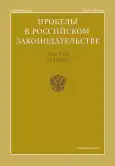Territories and Entities with High Innovation Potential: Problems and Prospects for Development
- Authors: Gromova E.A.1
-
Affiliations:
- South Ural State University
- Issue: Vol 17, No 1 (2024)
- Pages: 67-73
- Section: Private Law (Civil) Sciences
- URL: https://bakhtiniada.ru/2072-3164/article/view/254131
- EDN: https://elibrary.ru/OMTLSY
- ID: 254131
Cite item
Abstract
The creation of competitive digital innovations and technologies is one of the national interests of the Russian state, therefore, today it is extremely important to stimulate their development. That is why the study of territories and entities with high innovation potential is one of the conditions for achieving the goal. The purpose of the study was to identify the main problems and prospects for the development of legal regulation of innovation clusters, special economic zones, techno parks, innovative scientific and technological centers, as well as the Innovation Center "Skolkovo". Applying the formal-legal method, as well as the method of comparative-legal analysis and systematization, the author has identified common features characteristic of such territories and entities and unites them in the system of territories and entities with high innovative potential. The main gaps and other shortcomings of legal regulation of territories and entities with high innovation potential are identified, and ways to eliminate them are proposed. In particular, it is proposed to expand the use of private legal contractual principles in the framework of cooperation between the state and subjects of innovative entrepreneurship, to legislate the grounds and conditions for the formation of clusters within the boundaries of such territories and entities, as well as to include in the criteria for assessing their effectiveness the assessment of the "contribution" of residents and participants of such territories and entities to the sustainable development of the Russian state.
Full Text
##article.viewOnOriginalSite##About the authors
Elizaveta A. Gromova
South Ural State University
Author for correspondence.
Email: gromovaea@susu.ru
ORCID iD: 0000-0001-6655-8953
SPIN-code: 8876-2020
Scopus Author ID: 652593
ResearcherId: 57208846603
Cand.Sci.(Law), Associate Professor, Deputy Director of the Law Institute for International Activities, Associate Professor of the Department of Entrepreneurial, Competition and Environmental Law
Russian Federation, ChelyabinskReferences
- Andreev V.K. Entrepreneurial legislation: scientific essays. Moscow: Statute, 2008. 366 p.
- Bezikova E.V. State financing and state support of special economic zones on the territory of the Russian Federation // Bulletin of Tomsk State University. Law. 2012. № 3 (5). p. 5-12.
- Gasnikov K.D., Obolonkova E.V. Legal regulation of territories with special conditions of economic development in the Russian Federation // Journal of Russian Law. 2017. № 1. p. 101-105.
- Gasumyanova A.V. Legal regime of entrepreneurship in special economic zones of the Russian Federation. SPb.: GUEF, 2010. 126 p.
- Gorodov O.A. Pravovaya innovatika (Legal regulation of innovation activity), SPb, Izd. dom SPbSU, 2008. 408 p.
- Gromova E. A. To the question of granting pReferences in the field of public and corporate procurement to residents of territories with a special regime of economic activity // Jurist. 2021. № 2. p. 31-37.
- Gromova E. A. Stimulating legal regimes of entrepreneurial activity in the sphere of digital innovations and technologies : monograph. Moscow: Prospect, 2024.152 p.
- Gromova E. A. Prospects for the development of legislation on territories with a special regime of economic activity // Lex russica (Russian law). 2020. № 73 (11). p. 9-20.
- Gromova E.A. Ecologization of legislation on territories with a special regime of economic activity // Bulletin of the South Ural State University. Series: Law. 2020. Т. 20, № 1. p. 23-29.
- Gromova E.A. Agreement on the implementation of technology innovation activities. Moscow: Justitsinform, 2016. 216 p.
- Egorova A.A. Clusters, technological and industrial parks as special legal regimes for attracting investment in the economy of the region // Law and Economics. 2019. № 4. p. 60-66.
- Kostyunina G.M., Baronov V.I. Technoparks in foreign and Russian practice // Bulletin of MGIMO-University. 2012. № 3 (24). p. 91-99.
- Laptev V.V. Entrepreneurial (economic) law and the real sector of economy. Moscow: Infotropic Media, 2010. 81 p.
- Lisitsa V.N. Investitsionnoe pravo. Novosibirsk, 2015. 420 p.
- Serebryakova E.E. Techno-innovative special economic zones: legal aspects of creation and functioning: diss. candidate of juridical sciences. SPb, 2011. 125 p.
- Chelyshev M.Y. Interbranch legal regulation with civil-law component and conflict legal regulation: issues of correlation // Modern Law. 2009. № 1. p. 3-7.
- Tsirina M.A. Legal nature of the agreement of the management body of a special economic zone with a resident // Journal of Russian Law. 2013. № 2. p. 23-31.
- Tsygankov E. Law under the cluster // EZh-Jurist. 2016. № 3. p. 4-9.
- Gromova E., Ferreira D.B. Tools to stimulate Blockchain: application of regulatory sandboxes, special economic zones, and public-private partnerships // International Journal of Law in Changing World. 2023. Т. 2, № 1. Pp. 17-36. https://doi.org/10.54934/ijlcw.v2i1.48.
- Hacker Ph. Sustainable AI Regulation // SSRN Electronic Journal. 2023. 1. [Электронный ресурс]. URL: https://ssrn.com/abstract=4467684 (дата обращения: 15.01.2024).
- Zhuk A. Artificial Intelligence Impact on the Environment: Hidden Ecological Costs and Ethical-Legal Issues. Journal of Digital Technologies and Law. 2023. № 1(4). Pp. 932-954. https://doi.org/10.21202/jdtl.2023.40.
Supplementary files








